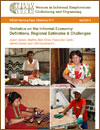WIEGO has worked closely with the International Labour Organization (ILO) in the development of statistics on the informal economy.
In 2022, WIEGO collaborated with ILO and the International Domestic Workers Federation (IDWF) to prepare Domestic Workers in the World: A Statistical Profile. In 2021, a collaboration between WIEGO, the ILO and HomeNet International (HNI) resulted in the publication of Home-Based Workers in the World: A Statistical Profile. These briefs present statistics on the numbers of workers in the sector and their share of employment by geographic regions and country income groups, the characteristics of their work (industry sector, occupation and status in employment) as well as their personal characteristics (educations and hours of work).
In 2018, this collaboration led to the ILO publication of the first-ever global estimates on the size of informal employment.
Women and Men in the Informal Economy: A Statistical Picture 3rd edition, shows 61% of all workers are informally employed. That’s 2 billion workers worldwide. The estimates reveal a clear relationship between low levels of GDP and high levels of informal employment in countries.
WIEGO subsequently developed Women and Men in the Informal Economy: A Statistical Brief (2019) by Florence Bonnet, Joann Vanek and Martha Chen, which summarizes the key indicators of informal employment from the 3rd edition.
A pamphlet, Counting the World's Informal Workers: A Global Snapshot (available in English, French and Spanish), offers data by status in employment, age, and branch of industry.
Earlier Collaborative Reports
In 2002, WIEGO compiled and analyzed available national data on informal employment for an ILO publication, Women and Men in the Informal Economy: A Statistical Picture. For many years this publication was seen as the pre-eminent source of statistics on informal employment.
In 2013, an update was jointly prepared and published by the ILO and WIEGO. Women and Men in the Informal Economy: A Statistical Picture, 2nd Edition builds on the 2002 edition but does not contain the regional estimates. Instead it presents more detailed data on informal employment and employment in the informal sector for 42 countries plus six cities in China and two provinces of Indonesia, and on categories of informal workers.
WIEGO authored a companion Working Paper with regional estimates. Statistics on the Informal Economy: Definitions, Regional Estimates and Challenges by Joann Vanek, Martha Chen, Franҫoise Carré, James Heintz and Ralf Hussmanns (2014) contains the updated regional estimates. The estimates were prepared by James Heintz using a more robust analytic method and based on data from many more countries than the 2002 publication.
In 2013, the ILO published a manual intended as a technical guide for producers of statistics on the informal sector and informal employment, Measuring Informality: A Statistical Manual on the Informal Sector and Informal Employment. The manual was a collaborative effort of the Delhi Group, WIEGO and the ILO.
